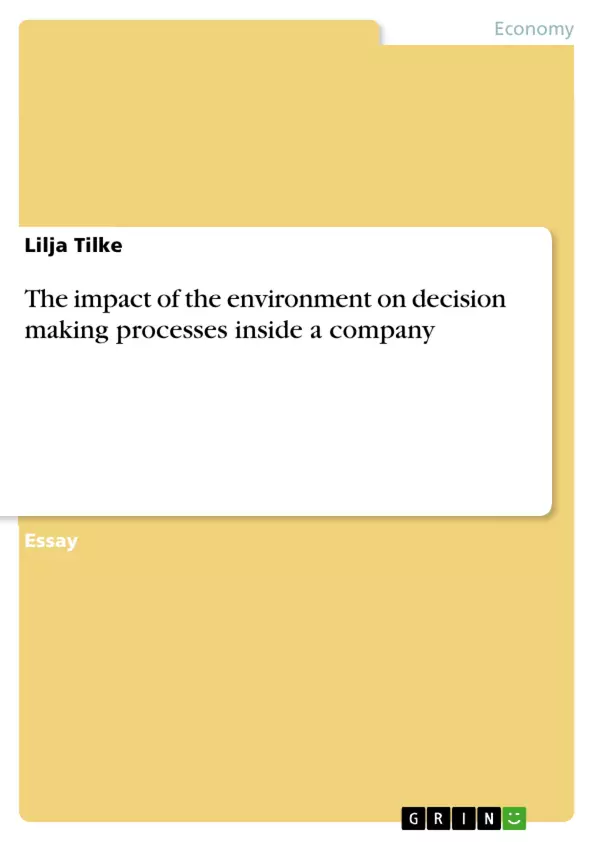This assignment deals with how employees are involved in the decision-making processes within a company. FischerAppelt has been chosen as an example to help to illustrate that process.
First of all, different management theories will be described. Therefore, Germany will be analysed and FischerAppelt will be characterized.
After that the relationship between employee satisfaction and decision-making processes will be described. The opportunities for FischerAppelt to involve their employees in decision-making processes will be discussed.
Inhaltsverzeichnis (Table of Contents)
- INTRODUCTION
- THEORY OF MANAGING PEOPLE
- Pluralist
- Unitarist
- Radical/ critical
- EUROPE/ GERMANY
- PARTNERSHIP AGREEMENT
- TRADE UNION VER.DI/ GERMANY
- FISCHERAPPELT
- EMPLOYEE INVOLVEMENT / PARTICIPATION
- EMPLOYEE INVOLVEMENT
- EMPLOYEE PARTICIPATION
- Employee satisfaction
- CONCLUSION
- LIST OF REFERENCES
Zielsetzung und Themenschwerpunkte (Objectives and Key Themes)
This assignment explores the relationship between employee involvement in decision-making processes and employee satisfaction within a company. Using FischerAppelt as a case study, the paper aims to analyze how different management theories impact this relationship in a German context.
- The impact of various management theories (pluralist, unitarist, and radical/critical) on employee involvement.
- The role of trade unions in promoting employee rights and involvement in decision-making processes.
- The significance of employee satisfaction in relation to decision-making processes.
- The opportunities for FischerAppelt to involve their employees in decision-making processes.
- The influence of German political and social structures on employee involvement.
Zusammenfassung der Kapitel (Chapter Summaries)
- Introduction: The assignment introduces the topic of employee involvement in decision-making processes and presents FischerAppelt as the case study. It outlines the scope of the analysis, including an exploration of management theories, the German context, and the relationship between employee satisfaction and decision-making processes.
- Theory of Managing People: This chapter discusses three different perspectives on managing people: pluralist, unitarist, and radical/critical. It examines the assumptions underlying each theory, including the potential for conflict between employees and managers and the role of trade unions in mitigating such conflicts.
- Europe/ Germany: This chapter explores the influence of German political and social structures on employee involvement. It highlights the democratic nature of Germany's political system and the significance of employee rights, including the right to participate in decision-making processes. It also explains how the pluralist perspective on managing people aligns with the German context.
- Partnership Agreement: This chapter focuses on the partnership agreement between management and trade unions, which emphasizes the development of decision-making processes and a satisfactory work-life balance for employees. It outlines the role of trade unions in facilitating employee involvement in decision-making.
- Trade Union ver.di/ Germany: This chapter provides an overview of the trade union ver.di, one of Germany's largest trade unions. It describes the union's goals and its commitment to promoting solidarity, justice, and the recognition and value of employees' efforts.
- FischerAppelt: This chapter introduces FischerAppelt, a leading German agency group specializing in content-related matters and integrated communication. It outlines the company's areas of expertise, including public relations, film, and digital marketing, and identifies its five subsidiary agencies.
Schlüsselwörter (Keywords)
The keywords central to this work include employee involvement, decision-making processes, employee satisfaction, management theories (pluralist, unitarist, radical/critical), trade unions, partnership agreements, and the German context. The analysis utilizes FischerAppelt as a case study to explore these themes and their interconnectedness.
Frequently Asked Questions
How does FischerAppelt involve employees in decision-making?
The assignment analyzes opportunities for participation and how partnership agreements between management and employees are structured within the agency.
What is the difference between "Employee Involvement" and "Participation"?
Involvement often refers to communication and consultation, while participation implies a more formal role in the actual decision-making processes of the company.
What management theories are discussed?
The paper describes the pluralist (accepting conflict), unitarist (shared goals), and radical/critical perspectives on managing people.
How does employee satisfaction relate to decision-making?
The study explores how being part of the decision process increases job satisfaction, motivation, and loyalty to the company.
What is the role of trade unions in Germany like ver.di?
Unions like ver.di promote employee rights, solidarity, and justice, facilitating formal structures for participation in German companies.
- Arbeit zitieren
- Lilja Tilke (Autor:in), 2017, The impact of the environment on decision making processes inside a company, München, GRIN Verlag, https://www.grin.com/document/379136



